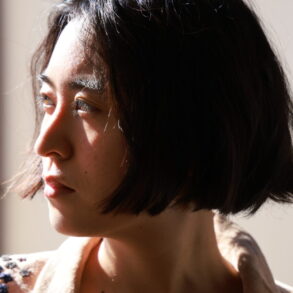MARFA — A simple white banner declaring “Marfa for a free Palestine” in bold black letters has been affixed to the Chinati Foundation’s Locker Plant studio window with blue painter’s tape for the past six weeks — a reflection of its latest artist in residence, Morgan Bassichis.
Bassichis, a New York-based musician, comedian and writer, held an open studio event last weekend in collaboration with several Marfa residents focusing on the Israel-Hamas war. “Artists have always played a really important role in social movements and in reflecting and amplifying the struggles of our times,” Bassichis told The Big Bend Sentinel.
“I’ve been so warmly welcomed during my time here and so inspired by all the work that people are already doing and engaged in,” they added. “I was really happy we got to celebrate it all together.”
The open studio featured readings by poet Eileen Myles, risograph prints by Eva Claycomb and sound healing by Daire Kelly. Hannah Delagi sold baked goods to help fundraise for families fleeing from Gaza, and a two-channel video made by Marfa resident Kate Sterchi and Palestinian artist Samara Sallam in 2021 comparing the landscapes of West Texas and Palestine was on view.
Fatima Anaza read excerpts from Donald Judd’s 1991 essay titled “Nie Wieder Krieg,” or “Never Again War,” that Bassichis wanted to include in the event. Judd’s political views, his stance on war as a veteran as well as the history of Chinati’s grounds as a military fort were of interest to Bassichis. Chinati Director Caitlin Murray introduced Bassichis to the essay, and they were moved by Judd’s opposition to war and militarism.
“The connections he made between the destruction that war wrecks — on people and architecture and land — and its impacts at home on the American economy … I was really thrilled to find this powerful essay, and I wanted to put it in the space,” Bassichis said.
Bassichis played keyboard and sang with Calletana Vargas, repeating the sentiment “We’ll keep reaching for each other,” to honor the life of Cecilia Gentili, a trans activist that recently passed away. Bassichis also set art historian and critic Douglas Crimp’s 1989 essay “Mourning and Militancy” to song, opening with, “There is no question but that we must fight the unspeakable violence we incur from the society in which we find ourselves.”
The artist said the past essays are important to draw from in the wake of contemporary issues. “We should continue to not just celebrate anti-war histories in the past, but to draw on their courage and clarity to reject wars that are happening now,” Bassichis said.
Bassichis is currently part of a group calling on Marfa’s City council to adopt a “Ceasefire in Gaza Resolution,” a move no other Texas city has yet to make. Organizers are circulating a petition that has garnered around 450 signatures in support of the resolution that they will bring to City Council for discussion and a vote later this week.
Bassichis said people across the world are outraged and activated to help “stop Israel’s genocidal assault on Gaza,” and citizens of the tiny town of Marfa are no exception. “Every single thing we do matters no matter how small it seems,” Bassichis said. “It is a beautiful, sacred thing when we use whatever spheres of influence we have to join with the millions around the world calling for justice.”
A series titled “To Do Marfa” of comedic lists, common in Bassichis’ practice, was also on display. Jotted down on found paper, including museum maps and a flier for the Lone Star Poetry Gathering, the artist completed one each day of their residency. “It becomes a kind of record of the mundane and everyday and also the more existential and political questions of daily life that all of us are navigating,” they said. A series of prints of “To Do Marfa” are forthcoming.
This post was originally published on this site be sure to check out more of their content




